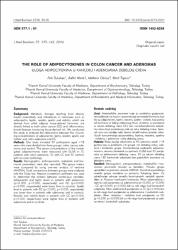| dc.contributor.author | Tülübaş, Feti | |
| dc.contributor.author | Mete, Rafet | |
| dc.contributor.author | Öznur, Meltem | |
| dc.contributor.author | Topçu, Birol | |
| dc.date.accessioned | 2022-05-11T14:07:44Z | |
| dc.date.available | 2022-05-11T14:07:44Z | |
| dc.date.issued | 2014 | |
| dc.identifier.issn | 1452-8258 | |
| dc.identifier.issn | 1452-8266 | |
| dc.identifier.uri | https://doi.org/10.2478/jomb-2013-0001 | |
| dc.identifier.uri | https://hdl.handle.net/20.500.11776/5187 | |
| dc.description.abstract | Background: Metabolic changes resulting from obesity, insulin insensitivity, and imbalances in hormones such as adiponectin, leptin, resistin, apelin and visfatin, which are derived from white adipose tissue-derived hormone, are directly linked to both colon cancer (CC) and inflammatory bowel diseases increasing tissue-derived risk. We conducted this study to evaluate the relationship between the circulating concentrations of adiponectin, leptin, resistin, apelin and visfatin and colon adenoma and CC. Methods: Our study included 90 participants aged >18 years who were divided into three groups: colon cancer, adenoma and control. The serum concentrations of the investigated adipohormones were measured with ELISA in 30 patients with colon adenoma, 30 with CC and 30 controls with no colon pathology. Results: Demographic, anthropometric, metabolic and hormonal parameters were also recorded. The group means were compared by using one-way analysis of variance (ANOVA). Dual comparisons between groups were analyzed with the Tukey test. Pearson correlation coefficient was used to determine the relation between continuous variables. Adiponectin and leptin levels in patients with adenomas (p<0.000; p<0.000, respectively) and CC (p<0.000; p<0.000, respectively) were lower than in controls. Apelin level in patients with CC (p<0.000; p<0.000, respectively) was lower than in patients with adenomas and in controls. Resistin and visfatin levels in patients with CC (p<0.000; p<0.000, respectively) were higher than in patients with adenomas and in controls. Conclusions: We have concluded that adiponectin, leptin, resistin, apelin and visfatin levels may play an important role in colon carcinogenesis. We also assume that adiponectin and leptin may be associated with the risk of colon adenoma. | en_US |
| dc.language.iso | eng | en_US |
| dc.publisher | Soc Medical Biochemists Serbia | en_US |
| dc.identifier.doi | 10.2478/jomb-2013-0001 | |
| dc.rights | info:eu-repo/semantics/openAccess | en_US |
| dc.subject | adiponectin | en_US |
| dc.subject | apelin | en_US |
| dc.subject | visfatin | en_US |
| dc.subject | colon adenoma | en_US |
| dc.subject | colon cancer | en_US |
| dc.subject | Colorectal Carcinogenesis | en_US |
| dc.subject | Adiponectin | en_US |
| dc.subject | Leptin | en_US |
| dc.subject | Resistin | en_US |
| dc.subject | Breast | en_US |
| dc.subject | Expression | en_US |
| dc.subject | Visfatin | en_US |
| dc.subject | Apelin | en_US |
| dc.subject | Risk | en_US |
| dc.subject | Proliferation | en_US |
| dc.title | The Role of Adipocytokines in Colon Cancer and Adenomas | en_US |
| dc.type | article | en_US |
| dc.relation.ispartof | Journal of Medical Biochemistry | en_US |
| dc.department | Fakülteler, Tıp Fakültesi, Temel Tıp Bilimleri Bölümü, Tıbbi Biyokimya Ana Bilim Dalı | en_US |
| dc.department | Fakülteler, Tıp Fakültesi, Dahili Tıp Bilimleri Bölümü, İç Hastalıkları Ana Bilim Dalı | en_US |
| dc.department | Fakülteler, Tıp Fakültesi, Cerrahi Tıp Bilimleri Bölümü, Tıbbi Patoloji Ana Bilim Dalı | en_US |
| dc.department | Fakülteler, Tıp Fakültesi, Temel Tıp Bilimleri Bölümü, Biyoistatistik Ana Bilim Dalı | en_US |
| dc.authorid | 0000-0002-6396-3168 | |
| dc.identifier.volume | 33 | en_US |
| dc.identifier.issue | 2 | en_US |
| dc.identifier.startpage | 135 | en_US |
| dc.identifier.endpage | 142 | en_US |
| dc.institutionauthor | Tülübaş, Feti | |
| dc.institutionauthor | Mete, Rafet | |
| dc.institutionauthor | Öznur, Meltem | |
| dc.institutionauthor | Topçu, Birol | |
| dc.relation.publicationcategory | Makale - Uluslararası Hakemli Dergi - Kurum Öğretim Elemanı | en_US |
| dc.identifier.wos | WOS:000332683700001 | en_US |



















